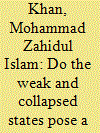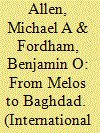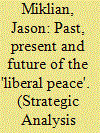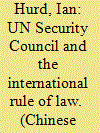| Srl | Item |
| 1 |
ID:
120873


|
|
|
|
|
| Publication |
2013.
|
| Summary/Abstract |
The human security agenda, as currently operationalized by the majority of powerful states and institutions, exhibits a distinct liberal character, simultaneously contributing to and legitimizing the dominant liberal peacebuilding approach. As such, there has been a crowding out of alternative conceptions of human security, including those which focus on emancipation. This latter approach to human security offers a more transformative vision through its focus on issues such as hegemony, power, and freedom. Paths to such forms of human security have yet to materialize, largely due to the characteristics of a liberal-internationalist approach which has narrowed the political space in which challenges to the status quo can be imagined and realized. In its failure to allow for a genuine plurality of voices and in its insistence on creating false consensus, liberal peacebuilding blocks the emancipatory promise of a genuine shift from state to human security. A potential starting point for imagining alternatives to liberal peacebuilding and thus the creation of emancipatory forms of human security is to consider the role and possibilities for agonistic modes of politics and peacebuilding. Transforming inevitable differences that are part of human society into agonistic relationships-where differences exist and are negotiated among adversaries (as opposed to enemies)-opens up the political space required to challenge dominant liberal approaches to human security and enables a shift toward the emancipatory model.
|
|
|
|
|
|
|
|
|
|
|
|
|
|
|
|
| 2 |
ID:
134112


|
|
|
|
|
| Publication |
2014.
|
| Summary/Abstract |
Weak and collapsed states are portrayed as the primary global threat to security so frequently by the politicians, journalists and policy makers that it has almost become a reality. Yet, this seemingly universalised and undertheorised concept bears a different meaning to each actors and demands critical examination. From an international relations perspective, this paper examines the extent to which the weak and collapsed states challenge the realist account of maintaining world order. Conceptualising state weakness, this paper outlines the key realist assumptions to contrast those in weak states' context. Highlighting the realists underpinning that the structure of international system is resilient, the paper concludes that the concept of weak and collapsed states is a political construction and such states do not constitute a critical mass challenging the essential continuity of international order. International system is still dominated by powerful states and the opportunity for weak states to graduate upward under a resilient international system tends to outweigh the forces of weak and collapsed states, keeping the realist account of world order undaunted.
|
|
|
|
|
|
|
|
|
|
|
|
|
|
|
|
| 3 |
ID:
109579


|
|
|
|
|
| Publication |
2011.
|
| Summary/Abstract |
Most bargaining models of war suggest that the absence of ex-ante uncertainty about the outcome of fighting should lead to negotiated outcomes rather than military conflict. Nevertheless, relatively weak states still refuse demands from dominant powers in many cases. This paper tests several explanations for this phenomenon. James Fearon's account of rationalist explanations for war suggests two reasons states might resist militarized demands even if there is little or no chance of military victory. First, the weaker state might not concede if the stronger state's threat is not credible. Second, guerrilla resistance to enemy occupation might create a commitment problem for the stronger state if it could impose costs that exceed the value of the stronger state's objectives. Alternative explanations that do not assume the state behaves as a unitary rational actor focus on special features of state preferences, such as the importance attached to political sovereignty and territorial integrity, or on the difficulties state institutions might pose for making the policy changes necessary to concede the more powerful state's demands. Empirical analyses of MID and ICB data point to the importance of both rationalist claims about threat credibility and alternative arguments about state preferences.
|
|
|
|
|
|
|
|
|
|
|
|
|
|
|
|
| 4 |
ID:
133603


|
|
|
|
|
| Publication |
2014.
|
| Summary/Abstract |
The stunted and stumbling progress of the 'liberal peace' philosophy since 1990 tells a complex story. In this article, I give a history of the liberal peace project from its academic and activist origins to today's global application, discussing how policymakers and liberal peace architects see liberal peacebuilding, and how emerging powers such as India and China relate to these goals. I close with a discussion of the future of liberal peacebuilding, the 'Business for Peace' paradigm and how relationships between powerful states and their peripheries will still matter despite a more consolidated international aid community.
|
|
|
|
|
|
|
|
|
|
|
|
|
|
|
|
| 5 |
ID:
133958


|
|
|
|
|
| Publication |
2014.
|
| Summary/Abstract |
This article considers the relationship between international law and the UN Security Council. The practical power of the Council is constituted at the intersection of its legal framing, its political legitimacy, and the interests of powerful states. This sometimes means the Council has less power than is assigned to it by the UN Charter, but it often means that it has more. It is clear that the Council sits within the international legal system, the legal limits on its action are interpreted in light of prior Council practice, and thus the meaning of 'compliance' and 'violation' of the Charter changes over time. Some transgressions of the Charter are understood as informal amendments to it; others are seen as threats to international peace and security that impel enforcement action. This ambiguity in the law and practice of the United Nations is inherent in the idea of the 'international rule of law'. The Council straddles the unstable boundary between international law and politics, both undermining and reinforcing the distinction between them.
|
|
|
|
|
|
|
|
|
|
|
|
|
|
|
|